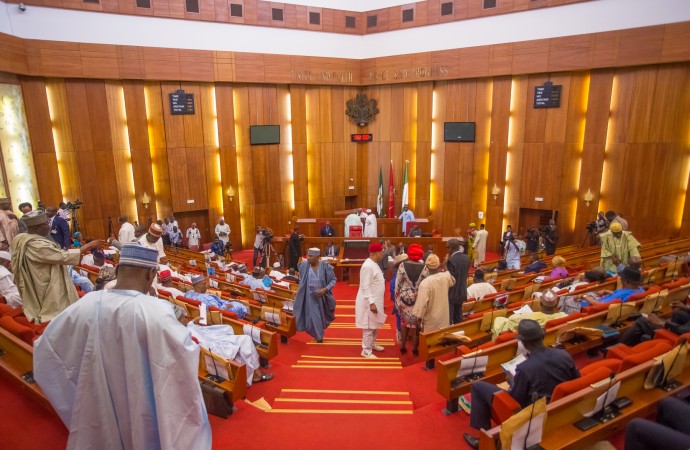Nigeria’s upper legislative chamber, the senate, says only 11 states have deliberated and voted on the constitution amendment bills.
Ovie Omo-Agege, deputy senate president of the senate, disclosed this on Tuesday during a press conference in Abuja.
The deputy senate president said the states include Abia, Akwa Ibom, Anambra, Delta, Edo, Kaduna, Katsina, Kogi, Lagos, Ogun and Osun.
In March, the senate and house of representatives voted on bills seeking to amend the 1999 constitution.
The red and green chambers agreed on some of the bills and differed on others, while a total of 44 bills were transmitted to the state houses of assembly.
According to sections 9(2) and (3) of the 1999 constitution, two-thirds of all the state assemblies — 24 states — are required for each amendment to be approved.
“After several meetings and engagements with the state houses of assembly, the joint committee of the senate and the house of representatives recommended 66 constitution alterations bills for passage,” Omo-Agege said on Tuesday.
“We considered that those 66 bills have a considerable level of national consensus as garnered from public consultations. Out of the 66 Bills, 44 were approved by the senate and house of representatives. Subsequently, the 44 Bills were transmitted to the 36 state house of assembly on 29th March 2022 for approval in line with section 9(2) stipulations of the constitution.
“The 44 bills transmitted to the State Houses of Assembly seek to, amongst others: strengthen the legislature’s authority to enable it to serve as an effective pillar of checks and balance to the executive, strengthen independent constitutional bodies, create and strengthen a culture of good governance, address issues of revenue leakages and unbridled government spending, and enhance effective administration of justice in Nigeria.
“Now, let us give you a sense of where we are with the Bills as of today. Six months after the transmission of these bills to state assemblies, it is most disheartening to inform you that only 11 state house of assemblies have demonstrated their independence and loyalty to the constitution regarding the 44 bills. 25 state houses of assemblies have yet to consider and vote on these bills.”
The deputy senate president said the 11 states “have successfully considered, voted on, and forwarded their resolutions on the 44 bills to the national assembly”.
“More worrisome is that while we are still expecting the receipt of the resolutions of the remaining house of assembly, we received a letter from the conference of speakers of state assemblies informing the national assembly that the remaining states will not act on the 44 bills unless the assembly passes four new bill they have proposed in the letter,” he said.
“The bills they propose seek to amend the constitution to: establish state police, establish state judicial council, streamline the procedure for removing presiding officers of state houses of assembly, and institutionalise legislative bureaucracy in the constitution”’
“We want to ensure everyone understands this: the national assembly is in no way averse to acting on any proposed Bill or memoranda appropriately tabled before it, at any time in its life.
“However, it is legally inappropriate for the conference of speakers to use the four bills as a quid pro quo to act on the 44 bills the national assembly 44 bills transmitted. It is clear, and we cannot overstate, that this letter is not in keeping with the obligation the constitution has placed on them regarding the constitutional amendment.”
